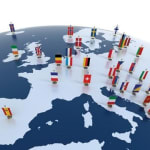 The first-ever Europe-wide strategy on plastics, adopted yesterday, is a part of the transition towards a more circular economy.
The first-ever Europe-wide strategy on plastics, adopted yesterday, is a part of the transition towards a more circular economy.It will protect the environment from plastic pollution whilst fostering growth and innovation, turning a challenge into a positive agenda for the Future of Europe. There is a strong business case for transforming the way products are designed, produced, used, and recycled in the EU and by taking the lead in this transition, we will create new investment opportunities and jobs. Under the new plans, all plastic packaging on the EU market will be recyclable by 2030, the consumption of single-use plastics will be reduced and the intentional use of microplastics will be restricted.
First Vice-President Frans Timmermans, responsible for sustainable development, said: "If we don't change the way we produce and use plastics, there will be more plastics than fish in our oceans by 2050. We must stop plastics getting into our water, our food, and even our bodies. The only long-term solution is to reduce plastic waste by recycling and reusing more. This is a challenge that citizens, industry and governments must tackle together. With the EU Plastics Strategy we are also driving a new and more circular business model. We need to invest in innovative new technologies that keep our citizens and our environment safe whilst keeping our industry competitive."
Vice-President Jyrki Katainen, responsible for jobs, growth, investment and competitiveness, said: "With our plastic strategy we are laying the foundations for a new circular plastics economy, and driving investment towards it. This will help to reduce plastic litter in land, air and sea while also bringing new opportunities for innovation, competitiveness and high quality jobs. This is a great opportunity for European industry to develop global leadership in new technology and materials. Consumers are empowered to make conscious choices in favour of the environment. This is true win-win."
Every year, Europeans generate 25 million tonnes of plastic waste, but less than 30% is collected for recycling. Across the world, plastics make up 85% of beach litter. And plastics are even reaching citizens' lungs and dinner tables, with microplastics in air, water and food having an unknown impact on their health. Building on the Commission's past work, the new EU-wide strategy on plastics will tackle the issue head on.
Today's plastic strategy will transform the way products are designed, produced, used, and recycled in the EU. Too often the way plastics are currently produced, used and discarded fail to capture the economic benefits of a more circular approach. It harms the environment. The goal is to protect the environment whilst at the same time lay foundations to a new plastic economy, where the design and production fully respect reuse, repair and recycling needs and more sustainable materials are developed.
Europe is best placed to lead this transition. This approach will bring new opportunities for innovation, competitiveness and job creation. With the plastic strategy, the Commission has adopted a Monitoring Framework, composed of a set of ten key indicators which cover each phase of the cycle, which will measure progress towards the transition to a circular economy at EU and national level.


